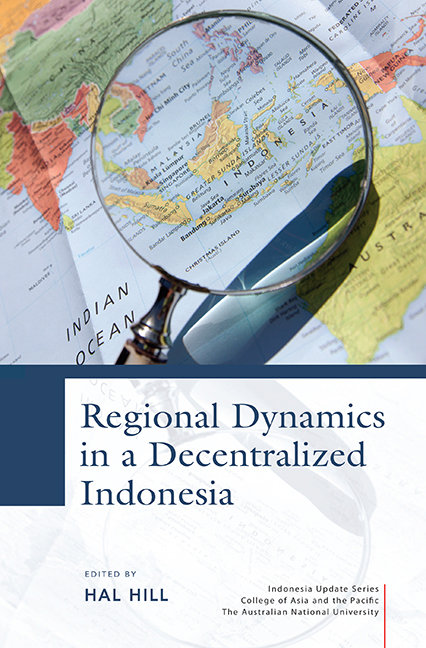Book contents
- Frontmatter
- Dedication
- Contents
- Tables
- Figures
- Contributors
- Acknowledgments
- Glossary
- Map of Indonesia
- 1 An introduction to the issues
- PART 1 HISTORICAL, ECONOMIC, POLITICAL AND SOCIAL PATTERNS
- PART 2 DECENTRALIZATION AND GOVERNANCE
- PART 3 LOCAL-LEVEL PERSPECTIVES
- PART 4 MIGRATION, CITIES AND CONNECTIVITY
- 13 Migration patterns: people on the move
- 14 Regional labour markets in 2002–12: limited convergence but integration nonetheless
- 15 The dynamics of Jabodetabek development: the challenge of urban governance
- 16 Challenges of implementing logistics reform in Indonesia
- PART 5 CHALLENGES FOR INDONESIA'S PERIPHERY
- Author index
- Subject index
- INDONESIA UPDATE SERIES
14 - Regional labour markets in 2002–12: limited convergence but integration nonetheless
from PART 4 - MIGRATION, CITIES AND CONNECTIVITY
Published online by Cambridge University Press: 21 October 2015
- Frontmatter
- Dedication
- Contents
- Tables
- Figures
- Contributors
- Acknowledgments
- Glossary
- Map of Indonesia
- 1 An introduction to the issues
- PART 1 HISTORICAL, ECONOMIC, POLITICAL AND SOCIAL PATTERNS
- PART 2 DECENTRALIZATION AND GOVERNANCE
- PART 3 LOCAL-LEVEL PERSPECTIVES
- PART 4 MIGRATION, CITIES AND CONNECTIVITY
- 13 Migration patterns: people on the move
- 14 Regional labour markets in 2002–12: limited convergence but integration nonetheless
- 15 The dynamics of Jabodetabek development: the challenge of urban governance
- 16 Challenges of implementing logistics reform in Indonesia
- PART 5 CHALLENGES FOR INDONESIA'S PERIPHERY
- Author index
- Subject index
- INDONESIA UPDATE SERIES
Summary
OVERVIEW
Like many large countries, Indonesia has a geographically fragmented labour market. Physical and economic contrasts between and within the major islands govern patterns of employment, wages and unemployment. The labour market still bears the signs of a dualistic division, dating from colonial or even pre-colonial times, between densely populated, poorer Java–Bali and most of the more land-abundant Outer Islands. Rapid national economic growth based on both export-oriented development and resource booms altered that historical pattern during the Soeharto years. The process became more complicated in the post-Soeharto democratic reform era after Indonesia's radical decentralization. Manufacturing stagnated in Java, while in the Outer Islands better governance and the return of revenue to resource-rich provinces provided more opportunities in some regions than in others for human resource development and economic diversification.
The widely varying rates of poverty discussed by Ilmma and Wai- Poi (Chapter 5) and Sumarto, Vothknecht and Wijaya (Chapter 12) are reflected to a large extent in differences in labour productivity across island groups and provinces. Labour productivity in Jakarta and East Kalimantan is more than twice the national average, whereas in Gorontalo and East Nusa Tenggara it is less than half. Most people in the former two provinces work in the formal sector in services, mining and manufacturing. In contrast, high levels of poverty and low labour productivity in the latter two provinces are closely associated with a concentration of employment in agriculture and the informal sector.
At the same time some indicators, such as inter-regional migration, suggest quite high levels of integration for a country of Indonesia's size and spread. There are also signs of convergence in labour productivity among some provinces and regions, as poorer provinces shed agricultural workers.1 Remarkable similarities across the country in trends towards greater formalization and improvements in unemployment rates and wages also suggest a degree of integration in the national economy. This has meant that some of the worse-off provinces have not been left behind. Nevertheless, in other provinces, high rates of population growth, low levels of schooling and associated low levels of outmigration have kept much of the workforce trapped in low-productivity agriculture.
- Type
- Chapter
- Information
- Regional Dynamics in a Decentralized Indonesia , pp. 342 - 367Publisher: ISEAS–Yusof Ishak InstitutePrint publication year: 2014

